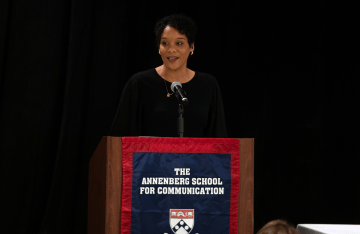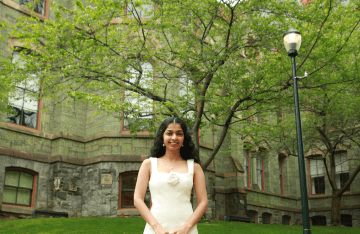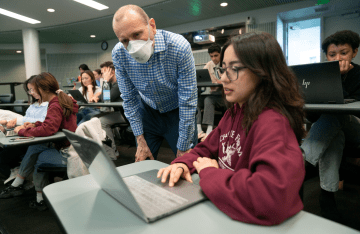Lauren Hitt (C'13) Delivers 2023 Communication Major Graduation Speech
The Communications Director for Rep. Alexandria Ocasio-Cortez spoke about the importance of following your gut in making career choices.
On May 14, after an introduction by Isabella Hassett (C'23), political communications expert Lauren Hitt (C'13) delivered the 2023 commencement address for Annenberg's Communication Major Graduation Ceremony, held at the Zellerbach Theater of the Annenberg Center for the Performing Arts. The full text is as follows:
Thank you so much, Isabella.
A very happy Mother's Day to all of the moms and mother figures in the audience, especially to my mom who is here today because it is also her reunion year. Though since it's Mother's Day. we will not say which reunion year.
My mom gave me the first professional advice that I can recall receiving.
On my way home from the fifth grade, I reported from the back of the car that when I grew up, I wanted to be a writer or, maybe, a lawyer.
I added the bit about being a lawyer because I thought it would please her. But instead, mom discouraged me. "You really like stories, you really like to read, you really like to write, and you should do what you're really passionate about."
Mom repeated that advice many times over the years. It told me from the earliest possible age that what I chose to do with my life should be principally about following my own interests, rather than trying to please her or anyone else. Thank you, mom, for that enormous gift.
I want to turn now to another special occasion. Today marks Dr John Jackson's final graduation ceremony as the Dean of the Annenberg School for Communication before he begins his new role as Provost for the University.
I was lucky enough to take two courses taught by Dr. Jackson, and in my experience, two things distinguished his classes:
First, they were always three-hour blocks, so if you had not done the reading, it was pretty tricky. Second, given his dual appointment in the anthropology department, his classes were predicated on the belief that to communicate effectively we had to appreciate the human condition. In other words, to speak to one another, we first had to understand each other - a remarkably simple yet often overlooked principle.
Dr. Jackson forced us to confront our humanity before we did anything else. I can hardly think of a better qualification for the next Provost of the University of Pennsylvania. Please join me in congratulating Dr Jackson.
It is usually the responsibility of the alumni speaker to dispense advice to the graduating class, but I find myself a bit reluctant to participate in that tradition. In the decades since I have graduated, the advice I have valued the most was the importance of keeping your own counsel — listening to your gut.
At my Annenberg graduation, our alumni speaker told us that she quit her first post-grad job in the same week she started simply because it did not feel right. At the time, I thought to myself, "How irresponsible. How juvenile. She couldn't have possibly known it wasn't the right fit after just a few days." But just a few weeks later, I did exactly the same thing.
My first job out of college was serving as a press assistant for a department with the state of New York under Governor Andrew Cuomo.
Just a few days in, I was offered a job in Bill de Blasio's mayoral campaign that summer. De Blasio was running third or fourth, with Anthony Weiner contesting for first. Despite those odds, my gut told me that the de Blasio's campaign was what I wanted to do. I had the campaign bug, and I liked the hustle of being an underdog.
When I gave my two weeks notice, just two weeks into my first job, several well-meaning people advised that I was making a mistake. Bill de Blasio would never win. and Andrew Cuomo had a very long and promising career ahead of him. He could even end up in the White House. One friend put it very bluntly: "If you make a bad impression on Andrew Cuomo, you will probably never work in New York politics again."
Well, as it turned out, Bill de Blasio did win that election, Andrew Cuomo is not the president. and I very much do work in New York politics.
I work in an industry that is full of predictions. In 2016 we were sure that Trump would never win. Last year, Republicans were going to sweep the House.
Polling tells us a lot — until it doesn't. Rising stars sometimes fall, and underdogs sometimes win. Everything is sure until it isn't.
In view of this uncertainty, I have found that the best decisions I have ever made are the ones led by my own gut. Of course, listening to your gut is not as easy as you might think. Sometimes it will get drowned out by other people's opinions, social pressures, or anxieties. Sometimes you'll be tempted by the easy choice. Inertia, after all, is the most powerful force. But it has been my experience that it is well worth taking the time to get to know yourself.
After we won the de Blasio campaign, I spent the next two years on the campaign trail moving from Brooklyn to Ohio and back to Philadelphia for the 2015 mayor's race. That may sound like a lot, but I was prepared to keep going.
In fact, I had a plan. I had a very clear, very grand plan. After winning the mayor's race, I planned to go work on a statewide race - Governor or Senate, preferably on a swing state, and then I would leverage that experience into a position on Hillary's 2016 presidential campaign From there, with any luck, I would go into the White House, all by the age of 26, leaving me plenty of time to accomplish my major career goals before settling down to have a family.
I was in the process of executing this flawless plan when our campaign manager in Philly called me into her office. We had won the election by this point, and she was in the process of staffing up the new Administration. Would I be interested in being the communications director for the next mayor of Philadelphia?
I was stunned. This was definitely not the plan. It would mean putting off a statewide race and probably also the presidential, and while a hugely significant job, it didn't have the sparkle of a race for the White House. I also wasn't really sure that I could do the job. While I might know how to be a communications director on a scrappy campaign, it seems plainly ridiculous for a 24 year-old to be communications director for a city of 1.5 million people.
I went home to consider the offer. It was intimidating and uncharted, but I could also feel in my gut that I really wanted to do it. I had really come to love Philly over the course of that race. I wanted to finish what we had started there.
So I stayed, and it's been the best decision I've ever made. City Hall is where the buck stops in most places. We handled everything from the opioid crisis and police-involved students to water main breaks and the teachers union contract. I worked harder than I ever had and made plenty of mistakes, but there wasn't anywhere else I could have learned more. I will always be so grateful that I listened to my gut about Philadelphia.
Your gut is an incredibly useful tool. It forces you to confront yourself rather than just continuing along as you are. It helps you assess whether the challenge in front of you is truly not the right fit or just a little scary. You will also find that your gut will comfort you when things get hard. And I cannot stress this enough: Things will get hard.
After a few years at the City of Philadelphia, I got back on the campaign trail and started applying to 2020 presidential campaigns. For months, I was not getting the responses I hoped for. One campaign manager was frank: You didn't work on the 2016 presidential. You haven't done a competitive statewide race - both opportunities I had foregone to stay in Philadelphia.
It was incredibly painful to hear, but I could never really bring myself to be angry with my choice to stay in Philly. I knew I wouldn't trade those years for anything. I knew they had made me better.
Things did not get a whole lot better for me in 2019 at the end of that presidential primary cycle.
I had the unique distinction of having worked on two losing campaigns, and by the time Thanksgiving rolled around, I found myself unemployed and moving into my parents home.
One of the professional hazards of working on campaigns is that you are usually unemployed around the holidays, which is exactly the same time you are catching up with old high school acquaintances and distant relatives. "So what are you up to, Lauren?" they would ask. "Oh I'm nearly 30, unemployed. and living with my parents — thank you for asking."
But just a few weeks after enduring these painful holiday encounters, I found myself interviewing for the job I have now. The chief of staff at the time told me that it was my time in Philadelphia that had stood out. Lots of applicants knew how to handle the congresswoman's national profile, but few of them had also experienced communicating complex bureaucratic government services to the people who needed them the most. They needed someone who could communicate locally and nationally.
That is where my professional story ends for now, but I must stress that most mornings I do not wake up feeling that my life has been tied up neatly into a bow. There are plenty of days that I wake up feeling behind or uncertain. But there are a few days that I wake up filled with regret.
Up until this point in your life, your success has largely been defined by the metrics of others — your professors, your parents, the admissions officer. Now you will be fully in charge of the grading rubric for your life.
Whether you live to work or work to live, whether you stay close to your loved ones or move across the country — these decisions are entirely up to you. No one or anyone else can truly tell you which of these choices are best, but it has been my experience that generally your gut already knows. You just need to learn to listen to it.
Thank you so much to the Annenberg School for Communication for having me here and a very well deserved congratulations to the class of 2023.



